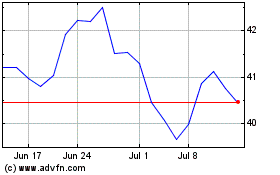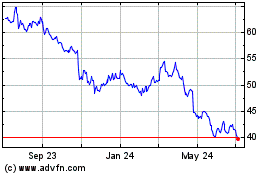Bristol-Myers Revenue Rises 1%, 2016 Profit Outlook Beats Expectations -- 2nd Update
January 28 2016 - 1:42PM
Dow Jones News
By Tess Stynes
Bristol-Myers Squibb Co. said its fourth-quarter revenue rose 1%
amid continued expansion of the pharmaceutical company's Opdivo
cancer immunotherapy franchise and sales growth of other key
drugs.
Earnings, excluding certain one-time items, and revenue beat
expectations. The company's 2016 per-share earnings guidance also
topped Wall Street views.
The company also said that a phase 3 study of Opdivo was stopped
early after an independent data monitoring committee concluded that
it met its primary endpoint of superior overall survival in
patients with hard-to-treat cases of head and neck cancer.
Bristol-Myers forecast per-share earnings of $2.30 to $2.40 and
revenue growth in the mid-single digits for 2016. Analysts polled
by Thomson Reuters expected per-share profit of $2.29 and revenue
growth of 6% to $17.4 billion.
For the three-month period ended Dec. 31, Bristol-Myers reported
that revenue increased to $4.29 billion from $4.26 billion a year
earlier. Excluding currency effects, the growth was 6%. Analysts
expected revenue of $4.15 billion.
"We have entered a period of expected growth," Chief Executive
Giovanni Caforio said on a conference call.
Bristol-Myers has gained attention as a leader in developing
drugs that enlist the power of the immune system against cancer.
The company's Opdivo, also known as nivolumab, was first approved
for sale in December 2014 for advanced melanoma and has since been
approved for other indications including lung cancer and renal
cancer.
For the latest quarter, Bristol-Myers reported Opdivo sales of
$475 million, bringing the total since its launch to $948
million.
Analysts had expected Opdivo will amass billions of dollars in
yearly sales, as its launch progresses and its use broadens to
other cancers.
Sales of Yervoy, another skin-cancer immunotherapy drug declined
again in the latest quarter, falling 28% to $265 million, partly
because of Opdivo's growth, particularly in skin cancer. Bristol's
Yervoy was the first immunotherapy, approved in 2011.
But for the year, the company's total immunotherapy product
sales jumped to $2.1 billion, from $1.3 billion in 2014. And
executives touted the early halt of a total of three Opdivo trials
in various cancers. "Regarding immuno-oncology, it was nothing less
than an incredible year, " Mr. Caforio said.
Mr. Caforio reiterated that the company was interested in
building out other parts of the company's portfolio, including
drugs for cardiovascular conditions such as heart failure.
Overall, Bristol-Myers reported a loss of $138 million, or 8
cents a share, compared with a year-earlier profit of $13 million,
or a penny a share, a year earlier. Excluding acquisition- and
collaboration-deal-related charges, and other items, per-share
earnings fell to 38 cents from 46 cents. Analysts expected an
adjusted per-share profit of 28 cents.
Gross margin rose to 77.8% from 77.3%.
Among other key drugs, sales of anticlotting drug Eliquis sales
more than doubled to $602 million from $281 million. Sales of its
hepatitis C franchise drugs also more than doubled, rising to $458
million from $207 million. But sales of HIV drugs Reyataz and
Sustiva fell to $584 million, from $725 million.
Jonathan D. Rockoff contributed to this article.
Write to Tess Stynes at tess.stynes@wsj.com
(END) Dow Jones Newswires
January 28, 2016 13:27 ET (18:27 GMT)
Copyright (c) 2016 Dow Jones & Company, Inc.
Bristol Myers Squibb (NYSE:BMY)
Historical Stock Chart
From Mar 2024 to Apr 2024

Bristol Myers Squibb (NYSE:BMY)
Historical Stock Chart
From Apr 2023 to Apr 2024
